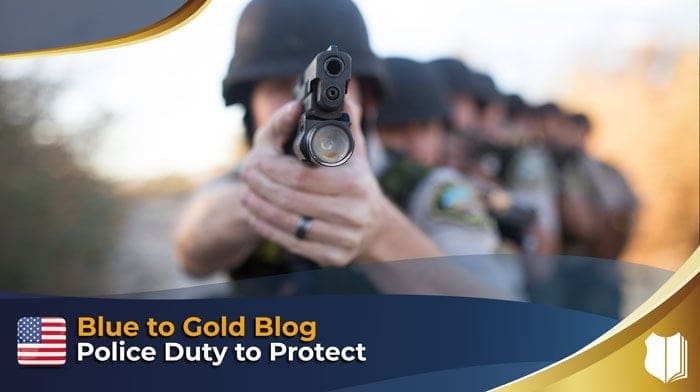Do police have a duty to protect others from harm? This question comes from an officer who says, “Hey, I took some training a while ago, and the presenters talked about how police do not have a duty to protect others, right? They have discretion. I’m trying to figure out where that case is.”
Let’s dive in. That case is a very, very famous case called DeShaney Versus Winnebago County. It’s a case from 1989. And it’s a seminal case in this area about essentially, you having a moral obligation, having a professional obligation, to do your job, to go save people, to protect others from harm, and so forth.
But when it comes to the law, when it comes to, “Hey, you did not show up in time, or you were negligent in your arrival, and you ended up crashing, and if you would have arrived, I would have not been robbed, a person’s life would have been saved, etc.,” all those type of things are not relevant.
At the end of the day, if police failed to protect others from harm, and the police were not the cause of it, there’s generally no liability under the Constitution. As the Supreme Court said, there’s nothing in the language of the due process clause that requires the state to protect the life, liberty, and property of its citizens against invasion by private actors.
The clause is phrased as a limitation on the state’s power to act, not as a guarantee of certain minimal levels of safety and security. It forbids the state itself of depriving individuals of life, liberty and property without due process of law. But this is not applicable to private actors.
Consistent with these principles, are cases that have recognized that the due process clause generally confers no affirmative right to governmental aid, even where such aid may be necessary to secure life, liberty or property interests.
So we have a job to do, the firefighters, ambulances, police and so forth. But when it comes to liability, it just is not that simple. You just don’t have a right from the government to protection from non-governmental threats to your life, liberty and property.
Can we also talk about what the US Supreme Court just affirmed in a case called New York Pistol & Rifle Association versus Bruen, a case where they said that people have a fundamental right to carry firearms outside the home for self protection.
I think to myself, “Well, this is a perfect example.” Why? Because I know New York City doesn’t like it. And they’re like, “But we have a 40,000 person police force.” But if if you want your citizens to depend on your police force, well, then you’d better guarantee them some one- on-one protection, right? I mean, are you going to to assign a personal police officer to everybody so that they don’t get robbed?
Is that what you’re going to do? If not, then people have a right to be their own first responder. In fact, is that not already the case? Aren’t our police really second responders in many ways? The first responder is the people. They should have some dog in the fight as far as their own protection and security is concerned. You know, how can they protect their family?
So I just want to kind of throw that in there. The Fourth Amendment, and the due process clause in the Fifth Amendment kind of all interweave together, and the Second Amendment is there actually, for people’s protection.
So going to the matter of shame, of course, we don’t want to shirk our duties. That’s not the message here. But in order to sue the police for not protecting somebody, it’s very hard to do.
I have to give you one last example. I remember watching stories during the riots of 2020 and how store owners were really upset in Seattle and Chicago and so forth, where the police were standing by watching looters, but they did not engage for various reasons. They didn’t have enough manpower, or maybe the politicians didn’t want them to get involved; whatever.
Some of those store owners were saying that they were going to sue the police for not protecting their property when they could have done something. And I feel for them. If I was
a store owner in Seattle and Chicago and so forth, I’d be very upset too, but legally, it’s almost impossible for them to sue. There’s no due process. There’s only the shame of the police not doing something about it when they could have.
Anyway, interesting conversation. Until next time, stay safe.










